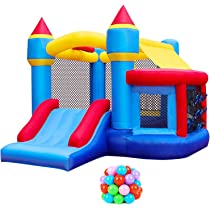
There are several safety rules that must be followed when it comes to your bounce house safety. First, make sure your bounce house is secured. It can easily become smashed and can cause injuries. For information on bounce-house incidents, you can check the MSNBC news stories or WMAR-2 news articles. You should also check out the rules regarding setting up and protecting bounce houses during bad weather.
Safety rules about bounce houses
There are several important safety rules to follow when using bounce houses. Safety first, don't allow sharp objects in the bouncehouse. These items can damage the bounce house and cause injuries. You must supervise your children whenever they are in the bouncehouse. Children who aren't closely supervised may fall off the bounce house and inflict serious injuries.
Be aware of the wind conditions. It is possible for bounce houses to be blown away by strong winds so it is important to secure them using heavy metal stakes. Even when deflated, bounce houses are still a danger to children.
There are rules to ensure a safe bounce house
There are many important points to remember when it comes to the security of a bounce house. First, it is important to avoid setting up the bouncehouse too close to the sea or in the middle high winds. This could cause the bouncehouse to blow away, which can lead to injuries. If you experience high winds, it is important to deflate your bounce house and keep it at least 4 feet from the ocean.

The second thing you need to do is ensure that the entryway to the bouncehouse remains open. You should always ensure that the entry to the bounce house is open for anyone who may be in close proximity. This will stop any access problems.
How to set up a bouncehouse
For maximum safety, you need to adhere to several rules when setting up bouncehouses. To ensure safety, you should always have someone on hand to supervise your kids, especially those who are smaller. You should also ensure that there is enough space for the bounce house, and that it has a flat surface. Also, it should be kept away from power lines and fences. Before you set up your bounce house, make sure to ask your representative about the rules of your rental company.
Another important rule to follow is to not let the bounce house get too hot. Hot surfaces can cause burns in small children, and hot bounce houses can damage the surface. It is best to allow the bounce house to get wet. However, it must be safe even if it gets wet. Some bounce houses are not meant for wet use.
Here are the rules for how to secure a bouncehouse during severe weather
Bad weather can make a bounce house dangerous, so be sure to properly secure it. You can secure your bounce house by placing it on grass and adding stakes. At a 45-degree angle, the stakes should be driven. Parents often make the mistake of placing their bounce house under the shade. Lightning can strike your bounce house so be sure to secure it.
It is important to keep your garden dry. Even a tiny amount of rain can cause harm. Older children are more active than younger kids, so they might end up jostling one another. Children could get soaked if the bounce house is located near a sprinkler.

How to secure a bounce house even in windy conditions
It is important to stake your bouncer into the ground in case of windy weather. Bounce houses that are blown over by strong winds can be damaged or picked up. These warning signs can be easily missed so take care to avoid any such incidents.
Anchor the bottom edge to your bounce house with ropes or bags. Make sure that a responsible adult is available to supervise the children.
FAQ
How do I shop smart online?
Shopping smart online means shopping with confidence. These are some tips to help you save money online.
Start by shopping around. Compare prices to find the best deal.
Consider using Ebates, which is a cash-back app. They work similar to cashback programs found at physical stores. When you shop through their app, you earn points based on the amount you spend. These points can then be used for discounts or gift cards.
Third, you should look out for promo codes. You can search for them at RetailMeNot.com. Enter the code at checkout to get your savings. You will instantly see your savings.
Don't forget clearance sections! You can often find incredible deals on top-end brands at discounted prices.
How can I avoid being conned when shopping online?
When purchasing online, it is important to stay vigilant. Before buying online, read reviews and check out customer feedback. Also, never send sensitive financial information via email. Instead, make use of a secure site such PayPal. This way, you can rest assured knowing that your information is safe.
Which are the best times to shop online?
Sunday is the best time to shop online for clothes. There are many stores open so you can browse and find exactly what you need. Monday is the best day to shop online for clothes. Last-minute shopping is best done on Tuesday. Wednesday is when you should start buying for Christmas. Thursday is the best day to start planning for Easter. Get ready for the summer holidays with preparations on Friday. Saturday is when you should start preparing for the school holidays. You should also finish any tasks that you have left for the week on Sunday.
Statistics
- The vast majority only change a password to protect privacy a few times a year (27 percent) or, more likely, never (35 percent). (pcmag.com)
- All items on AliExpress have an estimated delivery time on the product page, and it's usually anywhere from 20 to 60 days. (makeuseof.com)
- An approximately 90% increase in price affords Hotel X the opportunity of extreme profits under severe circumstances. (dos.ny.gov)
- Your Online Purchases 79% of Americans purchased goods and services online in 2018, which is expected to exceed 90% in 2023. (meetfabric.com)
External Links
How To
What are safe online shopping tips?
Online shopping safety is a key skill that anyone can learn. It's important to know how you can shop at different sites without being scammed.
You can read the rest of this article to learn how to purchase items online. This article provides all the tricks and tips you need to avoid falling for scams.
-
Do your research. Before you decide to shop online, it's essential to do your homework first. Look for reviews and customer feedback about the company that you are considering buying from. Ask friends for recommendations.
-
Compare prices. Compare prices across multiple sellers if you aren't sure if a particular shop is reliable. Use price comparison tools like Amazon Price Checker, Google Shopping, and Amazon Price Checker to help you compare prices. These tools can help you find the best prices from your favorite retailers.
-
Look out for red flags. Be aware of red flags that may indicate a scammer trying to trick your. You may find fake sites that use misspelled words and grammar errors. They often sell fake or incomplete products.
-
Beware of popup windows Pop-ups can be used to steal credit card numbers or passwords. If you encounter one of these, close them immediately by pressing "escape" or choosing another browser window.
-
Ask yourself questions. Think about these questions as you browse a website. Do I get what I need from it? Can I trust the people behind the site?
-
Don't give away your personal information. Unless you initiated a transaction, never give out financial information like your Social Security number or bank account number or credit card details via phone or email.
-
Avoid clicking on email links. It is very easy to click links in emails and end up on a fake website. Only open emails from trusted sources (such as banks) to avoid falling victim to this kind of fraud.
-
Use strong passwords. Strong passwords must include numbers, symbols, and letters. Make sure you keep your password secret and never share it with others.
-
Be careful about downloading files. Do not open attachments in email. Always download files directly from the source. Never open attachments sent by unknown senders. Also, delete attachments that ask for you to install a program as soon as possible.
-
Report suspicious activity. Contact your local police immediately if you suspect that your identity has been stolen. You can also file an FTC complaint.
-
Protect your device. You should have anti-malware software installed on your computer. This protection could stop hackers accessing your private data.
-
Watch out for scammers targeting seniors. Seniors are more susceptible to scammers because they are less likely than others to be able to spot fake messages and websites.